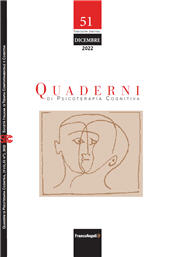Imagery Rescripting tra vendetta e perdono : una breve rassegna della letteratura
91-104 p.
L'Imagery Rescripting è una tecnica terapeutica che ambisce a modificare la rappresentazione mnestica di esperienze passate, collegate a dei sintomi. La sua efficacia è stata dimostrata nel trattamento del disturbo da stress postraumatico e in quello della fobia sociale. In questi disturbi, il rescripting prevede che il ricordo sia cambiato fermando l'abuso, togliendo potere all'aggressore e proteggendo la vittima. In tale contesto, una domanda interessante è se sia utile e sicuro oppure rischioso incoraggiare le persone a immaginare di vendicarsi e a esprimere impulsi aggressivi contro il carnefice. Questo contributo si propone di analizzare brevemente gli studi che hanno confrontato gli effetti di rescripting di: vendetta, evitamento e perdono.Dall'analisi della letteratura sembra emergere che i rescripting di vendetta non aumentano l'aggressività ma anzi la diminuiscono in maniera simile a rescripting nonviolenti e all'immagine del luogo sicuro.
Inoltre, l'aumento dell'affettività positiva nei rescripting di vendetta sembra essere mediato da un incremento del senso di giustizia dei partecipanti. Tuttavia, studi che hanno confrontato vendetta e perdono, hanno mostrato che essa diminuisce il senso di autoefficacia e non porta a una riduzione dell'affettività negativa rispetto al perdono e all'evitamento.Infine, le misure psicofisiologiche mostrano che il perdono è un processo che implica un maggiore impatto emotivo a breve termine. Pertanto, una combinazione di evitamento cognitivo (effettuato in questi studi tramite scenari positivi) a breve termine e un lavoro orientato al perdono a lungo termine sembrerebbe fornire l'equilibrio più promettente. [Testo dell'editore].
Imagery Rescripting (IR) is a therapeutic technique that aims to modify the memory representation of past experiences, linked to symptoms. Its efficacy has been demonstrated in the treatment of posttraumatic stress disorder and social phobia. In these disorders the memory of an abuse or of a past bullying experience is changed by stopping the aggressor, removing power from them and protecting the victim. In this context, an interesting question is whether it is useful and safe or risky to encourage people to imagine taking revenge and expressing aggressive impulses against the perpetrator. This paper aims to briefly analyze the studies that compared the effects of revenge, avoidance and forgiveness IR.From the analysis of the literature emerges that revenge does not increase aggression but rather decreases it in a similar way to nonviolent IR and to the imagery of the safe place.
Furthermore, the increase in positive affect in revenge IR, seems to be mediated by an increased sense of justice served in the participants. However, studies that compared revenge and forgiveness have shown that the former decreases the sense of selfefficacy and does not lead to a reduction in negative affect with respect to forgiveness and avoidance. Finally, psychophysiological measures show that forgiveness is a process that implies a greater emotional impact in the short term. Thus, a combination of shortterm cognitive avoidance (carried out in these studies via positive scenarios) and longterm forgivenessoriented work, would appear to provide the most promising therapeutic balance. [Publisher's text].
Fa parte di
Quaderni di Psicoterapia Cognitiva : 51, 2, 2022-
Articoli dello stesso fascicolo (disponibili singolarmente)
-
Informazioni
Codice DOI: 10.3280/qpc51-2022oa15183
ISSN: 2281-6046
PAROLE CHIAVE
- Imagery rescripting, vendetta, perdono, evitamento, giustizia
- Imagery rescripting, revenge, forgiveness, avoidance, justice


